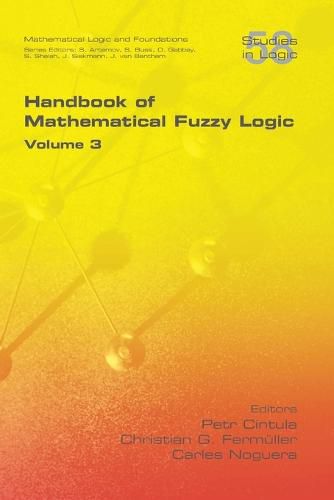Readings Newsletter
Become a Readings Member to make your shopping experience even easier.
Sign in or sign up for free!
You’re not far away from qualifying for FREE standard shipping within Australia
You’ve qualified for FREE standard shipping within Australia
The cart is loading…






This title is printed to order. This book may have been self-published. If so, we cannot guarantee the quality of the content. In the main most books will have gone through the editing process however some may not. We therefore suggest that you be aware of this before ordering this book. If in doubt check either the author or publisher’s details as we are unable to accept any returns unless they are faulty. Please contact us if you have any questions.
Originating as an attempt to provide solid logical foundations for fuzzy set theory, and motivated also by philosophical and computational problems of vagueness and imprecision, Mathematical Fuzzy Logic (MFL) has become a significant subfield of mathematical logic. Research in this area focuses on many-valued logics with linearly ordered truth values and has yielded elegant and deep mathematical theories and challenging problems, thus continuing to attract an ever increasing number of researchers. This handbook provides, through its several volumes, an up-to-date systematic presentation of the best-developed areas of MFL. Its intended audience is researchers working on MFL or related fields, that may use the text as a reference book, and anyone looking for a comprehensive introduction to MFL. This handbook will be useful not only for readers interested in pure mathematical logic, but also for those interested in logical foundations of fuzzy set theory or in a mathematical apparatus suitable for dealing with some philosophical and linguistic issues related to vagueness. This third volume starts with three chapters on semantics of fuzzy logics, namely, on the structure of linearly ordered algebras, on semantic games, and on Ulam-Renyi games; it continues with an introduction to fuzzy logics with evaluated syntax, a survey of fuzzy description logics, and a study of probability on MV-algebras; and it ends with a philosophical chapter on the role of fuzzy logics in theories of vagueness.
$9.00 standard shipping within Australia
FREE standard shipping within Australia for orders over $100.00
Express & International shipping calculated at checkout
This title is printed to order. This book may have been self-published. If so, we cannot guarantee the quality of the content. In the main most books will have gone through the editing process however some may not. We therefore suggest that you be aware of this before ordering this book. If in doubt check either the author or publisher’s details as we are unable to accept any returns unless they are faulty. Please contact us if you have any questions.
Originating as an attempt to provide solid logical foundations for fuzzy set theory, and motivated also by philosophical and computational problems of vagueness and imprecision, Mathematical Fuzzy Logic (MFL) has become a significant subfield of mathematical logic. Research in this area focuses on many-valued logics with linearly ordered truth values and has yielded elegant and deep mathematical theories and challenging problems, thus continuing to attract an ever increasing number of researchers. This handbook provides, through its several volumes, an up-to-date systematic presentation of the best-developed areas of MFL. Its intended audience is researchers working on MFL or related fields, that may use the text as a reference book, and anyone looking for a comprehensive introduction to MFL. This handbook will be useful not only for readers interested in pure mathematical logic, but also for those interested in logical foundations of fuzzy set theory or in a mathematical apparatus suitable for dealing with some philosophical and linguistic issues related to vagueness. This third volume starts with three chapters on semantics of fuzzy logics, namely, on the structure of linearly ordered algebras, on semantic games, and on Ulam-Renyi games; it continues with an introduction to fuzzy logics with evaluated syntax, a survey of fuzzy description logics, and a study of probability on MV-algebras; and it ends with a philosophical chapter on the role of fuzzy logics in theories of vagueness.